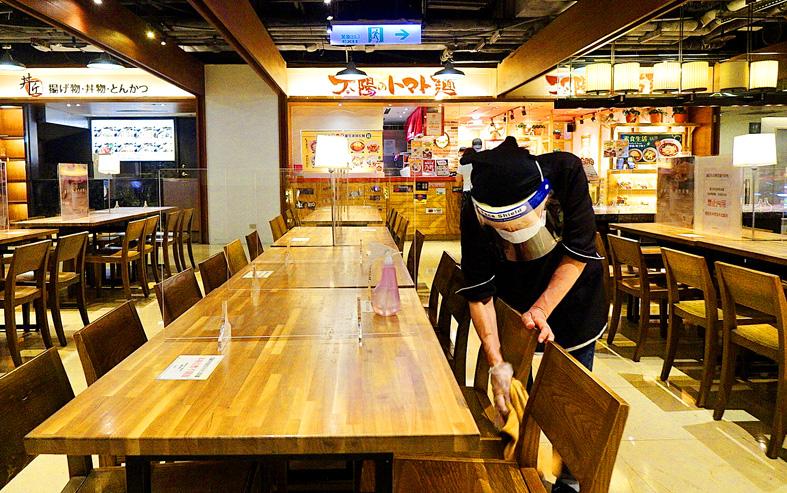Restaurants, night market food vendors and food courts in Taipei, New Taipei City and Yilan County can accept dine-in customers from today, provided that they strictly adhere to disease prevention regulations.
Restaurants elsewhere in Taiwan resumed dine-in services on Tuesday last week when the Central Epidemic Command Center lowered the COVID-19 alert to level 2.
Taipei and New Taipei City cooperated on the decision to lift the dine-in ban as residents frequently travel between the two cities, New Taipei City Mayor Hou You-yi (侯友宜) said yesterday.

Photo: Peter Lo, Taipei Times
The Yilan County Government later yesterday also announced it would lift the ban from today.
However, Hou said that New Taipei City could reimpose the dine-in ban if the Delta variant of SARS-CoV-2 spreads or there is a surge in domestic cases, adding that people should wear masks in public places.
If a restaurant has workers or customers who contract the virus, it would be ordered to suspend operations for three days and would not be permitted to accept dine-in customers for 11 days after it resumes operations, Taipei Mayor Ko Wen-je (柯文哲) said.
Restaurants, night market food vendors and food courts in Taipei and New Taipei City should strictly adhere to disease prevention regulations, the two city governments said, adding that eateries should arrange checkerboard seating for diners or place partitions on tables.
Should dine-in customers wish to share their meals, service personnel should divide each dish into small portions before serving it to customers, they said.
The number of indoor customers should be capped at 50 and outdoor customers should be capped at 100.
If restaurants want to accommodate more customers, they must implement measures to separate customers, and ensure that they enter and exit separately, the Taipei City Government said, adding they must also seek approval from the Taipei Department of Health.
Dining areas should be adequately ventilated, with tables being at least 1.5m apart, and food service providers must monitor their health daily, it added.
Dine-in customers at night markets must not share food or eat at the counter, the New Taipei City Government said, adding that customers are banned from eating while walking or they would be fined NT$3,000 to NT$15,000.
Meanwhile, sports centers, gyms, the Bali Aquatics Center and the Jonjiao Bay Surf Center would also reopen today, but swimming pools and shower facilities would remained closed, the New Taipei City government said.
Shrimp fishing ponds and claw machine stores would also be allowed to reopen today, the city governments said.

A magnitude 5.6 earthquake struck off the coast of Yilan County at 12:37pm today, with clear shaking felt across much of northern Taiwan. There were no immediate reports of damage. The epicenter of the quake was 16.9km east-southeast of Yilan County Hall offshore at a depth of 66.8km, Central Weather Administration (CWA) data showed. The maximum intensity registered at a 4 in Yilan County’s Nanao Township (南澳) on Taiwan’s seven-tier scale. Other parts of Yilan, as well as certain areas of Hualien County, Taipei, New Taipei City, Taoyuan, Hsinchu County, Taichung and Miaoli County, recorded intensities of 3. Residents of Yilan County and Taipei received

Taiwan has secured another breakthrough in fruit exports, with jujubes, dragon fruit and lychees approved for shipment to the EU, the Ministry of Agriculture said yesterday. The Animal and Plant Health Inspection Agency on Thursday received formal notification of the approval from the EU, the ministry said, adding that the decision was expected to expand Taiwanese fruit producers’ access to high-end European markets. Taiwan exported 126 tonnes of lychees last year, valued at US$1.48 million, with Japan accounting for 102 tonnes. Other export destinations included New Zealand, Hong Kong, the US and Australia, ministry data showed. Jujube exports totaled 103 tonnes, valued at

TRUST: The KMT said it respected the US’ timing and considerations, and hoped it would continue to honor its commitments to helping Taiwan bolster its defenses and deterrence US President Donald Trump is delaying a multibillion-dollar arms sale to Taiwan to ensure his visit to Beijing is successful, a New York Times report said. The weapons sales package has stalled in the US Department of State, the report said, citing US officials it did not identify. The White House has told agencies not to push forward ahead of Trump’s meeting with Chinese President Xi Jinping (習近平), it said. The two last month held a phone call to discuss trade and geopolitical flashpoints ahead of the summit. Xi raised the Taiwan issue and urged the US to handle arms sales to

BIG SPENDERS: Foreign investors bought the most Taiwan equities since 2005, signaling confidence that an AI boom would continue to benefit chipmakers Taiwan Semiconductor Manufacturing Co’s (TSMC, 台積電) market capitalization swelled to US$2 trillion for the first time following a 4.25 percent rally in its American depositary receipts (ADR) overnight, putting the world’s biggest contract chipmaker sixth on the list of the world’s biggest companies by market capitalization, just behind Amazon.com Inc. The site CompaniesMarketcap.com ranked TSMC ahead of Saudi Aramco and Meta Platforms Inc. The Taiwanese company’s ADRs on Tuesday surged to US$385.75 on the New York Stock Exchange, as strong demand for artificial intelligence (AI) applications led to chip supply constraints and boost revenue growth to record-breaking levels. Each TSMC ADR represents